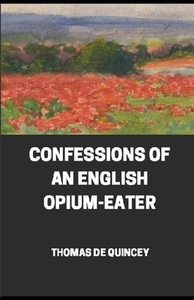You need to sign in or sign up before continuing.
Take a photo of a barcode or cover
I liked this book because it fits into my 'History of Medicine' obsession. It has beautiful language but is quite wordy. The description of the time and the locations in the story were fun to learn about, but the fact that drug addicts have beg around forever is sad. It was just a free, easy, period piece book.
The original junkie philosopher. Confessions is an autobiographical account of the author's drugged-out wanderings across England interpolated with classicist and philosophical musings. All the strands of DNA needed to form a writer like Huxley, Baudelaire or even Borges are in de Quincey's writing. A fine read for anyone with an interest in drugs and classical antiquity.
reflective
slow-paced
adventurous
dark
emotional
informative
inspiring
medium-paced
Instagram
Pubblicato in Italia anche con il titolo “Confessioni di un oppiomane” è uno scritto tipicamente ottocentesco nello stile (la prima pubblicazione risale al 1821) e pregno di un decadentismo romantico con cui l’autore guarda alle proprie disgrazie passate quasi con affetto, come fossero state esperienze formative per capire l’animo umano e la realtà.
Non stupisce quindi che De Quincey sia stato preso a modello dai decadenti francesi, primo tra tutti Baudelaire che tradusse parzialmente l’opera.
Lo stile di scrittura non è facile, pieno di incisi e di voli pindarici tipici di un flusso di coscienza quasi ininterrotto se non per la divisione in capitoli, e ad un lettore moderno alcune descrizioni di gruppi etnici o di nazionalità lontane da quelle europee potrebbero far storcere il naso – non per particolare cattiveria o ostilità da parte dello scrittore nei confronti dei suddetti gruppi, quanto più per una forma mentis di De Quincey tipica dell’uomo anglosassone ottocentesco – molto più del contenuto centrale dell’opera: un’apologia completa e totale, in contrasto anche con i medici dell’epoca, del consumo di oppio a scopo ricreativo o, per meglio dire, allo scopo di alleggerirsi la vita.
A parte una lode al consumo dell’oppio e una piccola parentesi sulle pene di questo (compresi i sintomi di quella che oggigiorno definiremmo crisi d’astinenza), in questa biografia appena romanzata trovano spazio divagazioni, introspezione e varie curiosità sulla contemporaneità dello scrittore che contribuiscono ad alleggerirne la lettura.
Nel complesso è stata una lettura piacevole anche grazie all’esigua lunghezza che contribuisce a non rendere lo scritto ripetitivo.
Pubblicato in Italia anche con il titolo “Confessioni di un oppiomane” è uno scritto tipicamente ottocentesco nello stile (la prima pubblicazione risale al 1821) e pregno di un decadentismo romantico con cui l’autore guarda alle proprie disgrazie passate quasi con affetto, come fossero state esperienze formative per capire l’animo umano e la realtà.
Non stupisce quindi che De Quincey sia stato preso a modello dai decadenti francesi, primo tra tutti Baudelaire che tradusse parzialmente l’opera.
Lo stile di scrittura non è facile, pieno di incisi e di voli pindarici tipici di un flusso di coscienza quasi ininterrotto se non per la divisione in capitoli, e ad un lettore moderno alcune descrizioni di gruppi etnici o di nazionalità lontane da quelle europee potrebbero far storcere il naso – non per particolare cattiveria o ostilità da parte dello scrittore nei confronti dei suddetti gruppi, quanto più per una forma mentis di De Quincey tipica dell’uomo anglosassone ottocentesco – molto più del contenuto centrale dell’opera: un’apologia completa e totale, in contrasto anche con i medici dell’epoca, del consumo di oppio a scopo ricreativo o, per meglio dire, allo scopo di alleggerirsi la vita.
A parte una lode al consumo dell’oppio e una piccola parentesi sulle pene di questo (compresi i sintomi di quella che oggigiorno definiremmo crisi d’astinenza), in questa biografia appena romanzata trovano spazio divagazioni, introspezione e varie curiosità sulla contemporaneità dello scrittore che contribuiscono ad alleggerirne la lettura.
Nel complesso è stata una lettura piacevole anche grazie all’esigua lunghezza che contribuisce a non rendere lo scritto ripetitivo.
I found this book in the Woden Library and was captured by the alluring title. As I read Thomas De Quincey's autobiography, I found that I strangely relate to him in so many obscure ways. I feel like I was once (although I don't personally believe in reincarnation) De Quincey in a past life.
Aside from that, this was a dense, but informative read. The language used was stylistically romantic, and though it took a lot of energy to read, De Quincey's command of words in sentences were able to imprint an exact image in my mind of what he was trying to say. His extraordinary gift to articulate ideas and pictures through language with pinpoint accuracy is admirable. While it was so fancily written, at times the book felt long and exhausting. There were also literally hundreds of footnotes in each of the three volumes, with countless asterisks, foreign allusions, Greek and Latin excerpts, and references that I felt like my eyes were constantly darting up and down the pages.
This is not a light read. It is an emotional journey full of melancholy and triumph. I also learnt a lot about opium. The last short sections of The English Mail-Coach were fantastic. But my favourite line from the whole book was in Suspiria De Profundis. When De Quincey was a child, he was weeping and grieving over the death of his older sister. What he wrote made me cry:
"And when I was told insultingly to cease 'my girlish tears,' that word 'girlish' had no sting for me, except as a verbal echo to the one eternal thought of my heart - that a girl was the sweetest thing I, in my short life, had known - that a girl it was who had crowned the earth with beauty, and had opened to my thirst fountains of pure celestial love, from which, in this world, I was to drink no more."
Aside from that, this was a dense, but informative read. The language used was stylistically romantic, and though it took a lot of energy to read, De Quincey's command of words in sentences were able to imprint an exact image in my mind of what he was trying to say. His extraordinary gift to articulate ideas and pictures through language with pinpoint accuracy is admirable. While it was so fancily written, at times the book felt long and exhausting. There were also literally hundreds of footnotes in each of the three volumes, with countless asterisks, foreign allusions, Greek and Latin excerpts, and references that I felt like my eyes were constantly darting up and down the pages.
This is not a light read. It is an emotional journey full of melancholy and triumph. I also learnt a lot about opium. The last short sections of The English Mail-Coach were fantastic. But my favourite line from the whole book was in Suspiria De Profundis. When De Quincey was a child, he was weeping and grieving over the death of his older sister. What he wrote made me cry:
"And when I was told insultingly to cease 'my girlish tears,' that word 'girlish' had no sting for me, except as a verbal echo to the one eternal thought of my heart - that a girl was the sweetest thing I, in my short life, had known - that a girl it was who had crowned the earth with beauty, and had opened to my thirst fountains of pure celestial love, from which, in this world, I was to drink no more."
Beautifully written navel-gazing by a guy who is easily offended and entirely self-centered. Only a tiny bit of this is actually about his experiences with opium. Most of it is a sort of loosely organized autobiography, complaining about how other people were mean to him or weren't as good as him at various things. He wanders off on lots of tangents and often seems to contradict himself when describing the effects of opium. His language is exquisite, but if I ran into him in a pub, I'd pretend I hadn't seen him.
Like a fruity red wine on a winters evening. One should also be sporting some Lionel Jeffries facial hair when reading. Very poetic, evocative, beautiful.
Something compelling about reading a book of this vintage on a mobile phone (via DailyLit). Holmes next, Cumberbatch would approve.
Something compelling about reading a book of this vintage on a mobile phone (via DailyLit). Holmes next, Cumberbatch would approve.




